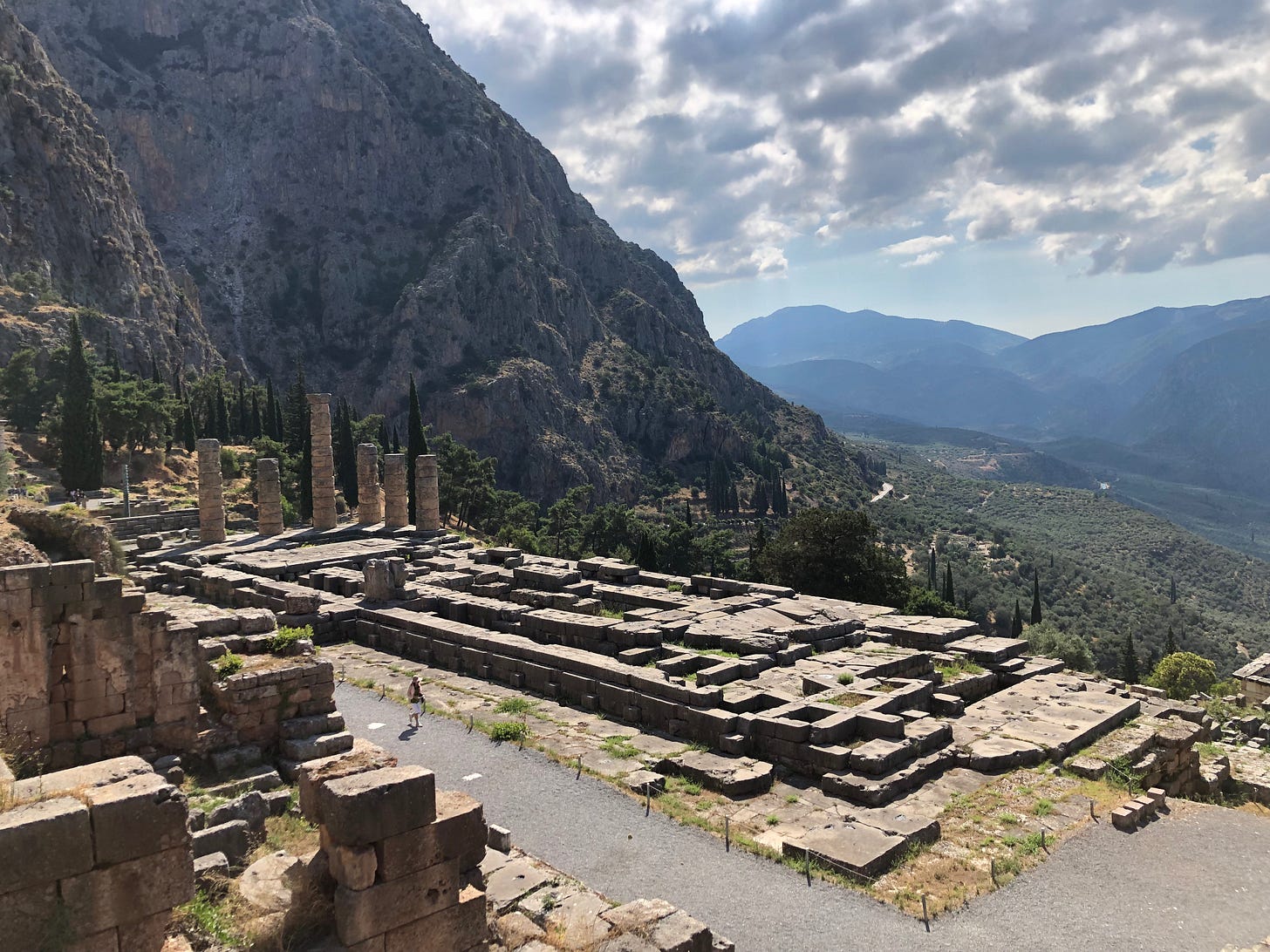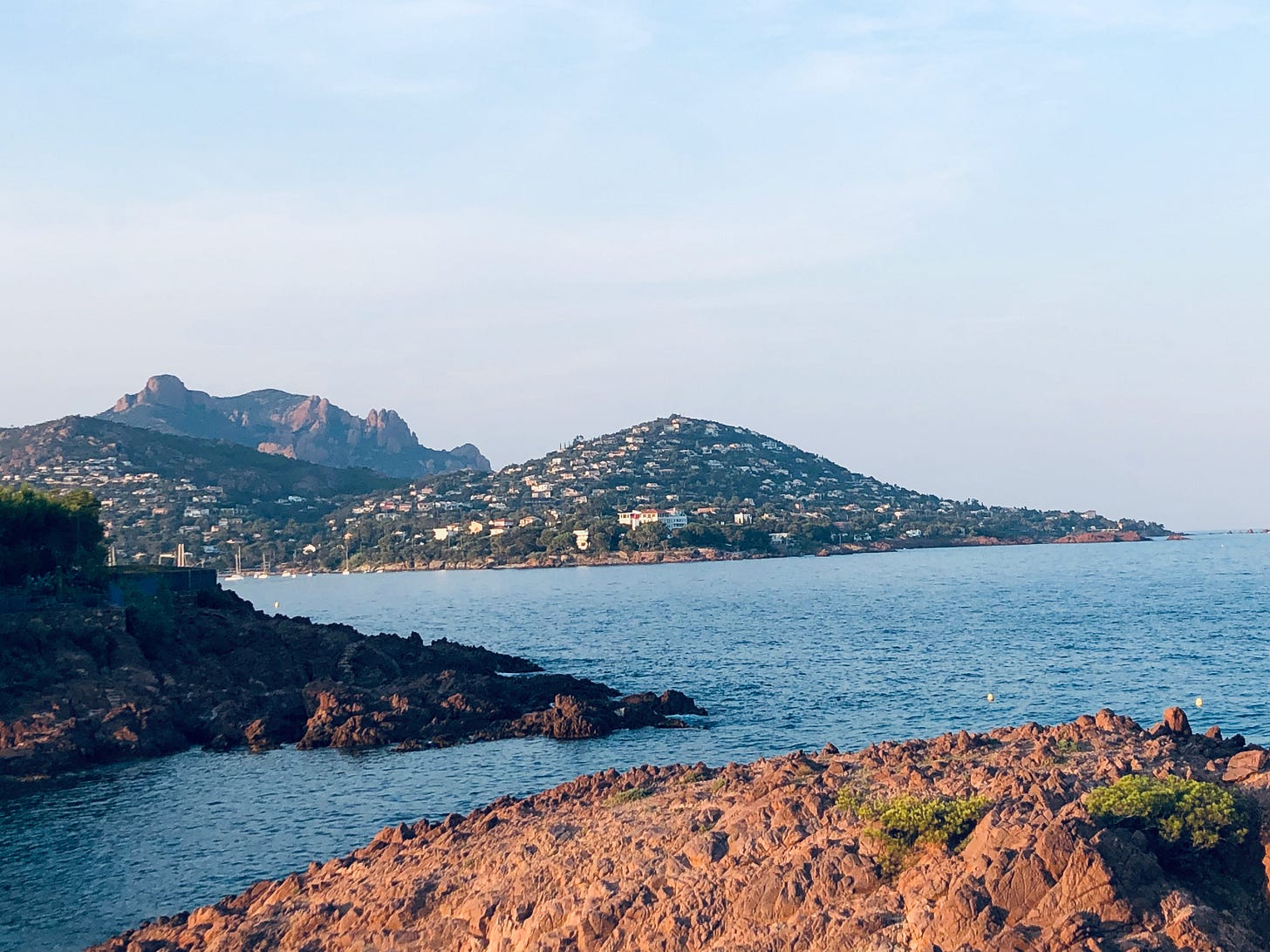What We're Doing...August 2022
Some things we've recently done in Paris (or will be doing) and recommend (or not)
I’m a little late with our mid-month newsletter. August is already more than halfway through its hot and heavy passage and I have yet to provide you with any details about what we’ve been doing this summer. I’m trying to practice my new “not running to catch trains” philosophy. Deadlines just are not so hard and fast as they once were. Besides—it’s summer. To start, here are a few images and impressions of our trip to Greece in July for a professional conference (see NWPL’s July 12, 2022 Newsletter) and family vacation time spent on France’s Côte d’Azure.
Oracles




The Weather
We are now back in Paris and the topic of the summer everywhere seems to be the weather. In France, it’s been one canicule (heatwave) after another. Near the end of July, temperatures in the Paris area hit 41.6 degrees Celsius (106.9 degrees Fahrenheit), beating the previous record of 40.4 C (104.8 F) set in 1947. Throughout France, rivers have dried up, water is being rationed, fires rage, and the predictions for the future of the planet get more and more grim.
I was happy to see that the US Congress was actually able to pass some climate change legislation. France’s latest climate law was put into effect last summer. However, both the US and French reactions to the climate crisis fall far short of radical, immediate, and lasting change. The question then becomes what can each of us do individually (besides voting for the greenest candidates) here on the local level to help ameliorate the climate crisis? Here is a Carbon Calculator that I found helpful in identifying some steps to take within our own household towards being more conscious of climate affecting behaviors. Jairo and I have reduced our carbon footprint significantly in the past year by ridding ourselves of two cars, recycling and composting more attentively, and buying more local, seasonal, and organic food.
Inflation
The other popular topic of conversation this summer has been inflation. Both the US and France passed comprehensive anti-inflation packages to help keep rising costs in check. For us, now living in France, the effects of inflation have been offset by the strength of the US dollar. Because all of our retirement income is in dollars, the fact that the dollar and the euro have become almost equal in value over the past year has really helped take the edge off of inflation for us. For example, the amount of dollars that must be exchanged to reach the euros needed for our monthly rent payment has lowered significantly. I can say that (although the total of euros has not changed) we are now paying about $200 less in monthly rent than last year at this time, just because of the better exchange rate. On the other hand, we are paying about €200 more than what I had budgeted originally for food each month. And our utility bill, which is only electricity, is going to be about €50 more each month than I had planned because of both inflation and the continuing war in Ukraine.
The one part of the French anti-inflation legislation that is going to effect us immediately is the elimination of the television tax. Yes, in France, everyone who owns a television was taxed about €150 each year to help pay for the national radio and television channels and their programming. It seems that now the funding for the nationalized public media will come from a general tax fund. I think that means their funding will be a little more precarious and my opinion on this is being supported by the usual French strikes. We will see how it all plays out eventually. In the meantime, we actually bought a TV! After one year of streaming movies and series on our computers, our eyes were getting smaller and smaller. So we purchased a 32 inch smart TV and put it on a stand that we can move around the apartment. First impressions: French smart TVs are much less smart than US smart TVs. I’ll let you know if our eyes get bigger.
A movie, a book, and a wonder
We went to see Baz Luhrman’s Elvis. The movie left me unmoved and unenlightened. Luhrman’s flashy editing and directing added nothing for me to the story of Elvis Presley nor were any of the relationships in the film—Elvis and the Colonel, Elvis and Priscilla, Elvis and his parents—deeply investigated. The main relationship—Elvis and the music—was also, I felt, handled superficially. The sequence in the film that concerned Elvis and his Las Vegas comeback came closest to revealing something that made him special as a musician, a performer, and a human being. But, otherwise, I thought the director and the actors missed the key elements that would have made this film more than a Hollywood biopic.
One book currently on my nightstand is David Lan’s As If By Chance: Journeys, Theatres, Lives. I was interested in this book because of the author’s way of weaving his personal life with his professional theatre career as a South African-born playwright and long-time artistic director of the Young Vic in London. His descriptions of his travels and experiences in Africa, in particular, are compelling. However, I’m left a bit underwhelmed by his stories of his life in the theatre. So far, he has not been able to describe the process of play production with any kind of penetrating insight. The random sequence of events makes it difficult to find connections between the stories of his Jewish family and meeting Gillian Anderson or Jude Law, for example.
I’m looking at a variety of memoirs right now as Jairo and I prepare to write about our own experiences in life and the theatre over the last fifty years or so. What kind of book can contain my North American, small-town, Midwestern, upbringing juxtaposed with Jairo’s South American, baroque, big-family, background; our two very different meetings and relationships with theatre master Jerzy Grotowski; and our more than thirty year collaboration as life partners and theatre artists? David Lan came to my attention because he was the co-playwright (with Caryl Churchill) of A Mouthful of Birds, which I directed at The University of Akron as part of the three year Dionysus Project. It was one of my favorite directing experiences.

The “wonder” of this section is Pina Bausch’s Barbe-Bleu, which was presented in July at Théâtre Chatelet as part of Théâtre de la Ville’s dance season. This riveting dance-theatre piece is from 1977, one of Pina Bausch’s first creations, and it’s more shocking and visceral than anything happening on stage today. The shifting power dynamics between the sexes, the use of the space, the violence and sensuality of the dancers makes this a provocative and unsettling theatre experience. How wonderful that a dance can be re-created years later with the same ferocity as was originally intended, even when its creator is no longer alive! Pina Bausch was a true genius.
Gabo, Hemingway…and Debora
One of the best things I’ve read this summer is an essay written in 1981 by the great Colombian Nobel prize winner, Gabriel Garcia Marquez, about his “meeting” with North American writer Ernest Hemingway on the streets of Paris in 1957. Maybe it’s because this brief essay crystallizes the penetrating kind of perception I am looking for in the various memoirs I’m reading as well as the South American—North American juxtaposition from my own life and work experience with Jairo, but the essay also works for me as a kind of blueprint for how to critically analyze another writer’s work in relation to one’s own story. You finish the essay feeling like you know both Gabo and Hemingway a little bit better.
In a way, the same thing happened during the recent visit to Paris of our dear friend and collaborator, Debora Totti. When Debora arrives to a place, everything is thrown into relief—there’s no hiding behind routine or depending upon habit or artifice. Her presence demands presence. Having Debora with us for five days in Paris allowed us to know ourselves, Debora, and Paris a little bit better. She was like the spirit of the oracle from Delphi running rampant. She makes next steps seem completely obvious. Thank you, Debora.
Addendum
As I prepare to send this newsletter off, the latest Paris canicule has ended with torrential rain and thunderstorms hitting the city. From the safety of our apartment, we watched the images (on our new television!) of water pouring down the stairs of metro stations and people wading through several different neighborhoods in Paris. There was a news report of a city bus driving through the deep water collecting at an underpass. I was reminded of all the many warnings to never drive your car through an underpass full of water. Water flooded into the bus and people had to raise their feet onto the seats near them. The bus made it through the water, but soon after broke down and the driver told the passengers to get out and walk. It was a bizarre video news story that showed in close up the immediate effects of our new climate status quo as the after effects enter our daily lives. There is no later. It’s now.







I think this was my favorite post. ❤️